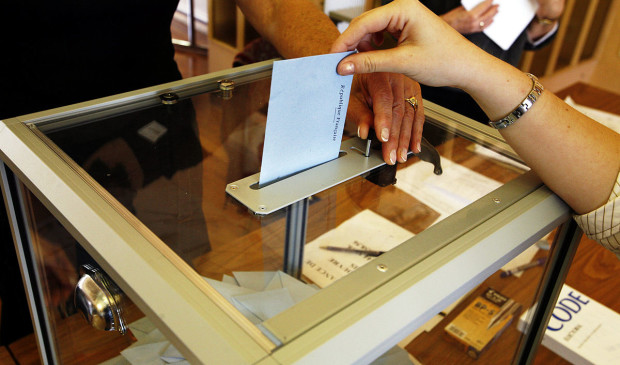Council sets ballot language for May 7 election
Thursday, February 18, 2016 by
Eva Ruth Moravec City Council on Wednesday voted 9-2 to set the language that will appear before voters in a May 7 election over regulations for transportation network companies.
Council members Ellen Troxclair and Don Zimmerman voted against the ordinance to set the language, which Council Member Ann Kitchen drafted. It reads: “Shall the City Code be amended to repeal City Ordinance No. 20151217-075 relating to Transportation Network Companies; and replace with an ordinance that would repeal and prohibit required fingerprinting, repeal the requirement to identify the vehicle with a distinctive emblem, repeal the prohibition against loading and unloading passengers in a travel lane, and require other regulations for Transportation Network Companies?”
In plainer language, voters will be asked to choose between an ordinance that Council adopted in December, which mandates that drivers eventually be fingerprinted, and an ordinance proposed by citizens to change those rules.
The citizens’ ordinance – created by the Ridesharing Works for Austin political action committee – first repeals the December ordinance, which required drivers to eventually be fingerprinted, then requires companies like Uber and Lyft to pay the city fees totaling 1 percent of their annual revenue.
“I don’t know how this election’s going to play out,” Mayor Steve Adler told reporters at his State of Our City address Tuesday. “As I sit here right now, I don’t like either of the choices.”
On Wednesday, Council met for about an hour in executive session before voting on the ordinance in chambers. Zimmerman proposed amended ballot language that mentioned the 1 percent fee, which Council rejected, also on a 9-2 vote.
“I think that it is abundantly clear that this ballot language supports the majority City Council opinion that you should vote down the ordinance,” Zimmerman said. Outside of City Hall, he added that Kitchen’s syntax “casts the whole thing in a negative light” and biases voters.
Kitchen, defending her choice of words, said she highlighted the differences between the two options before voters.
Wednesday’s vote sets into motion a process leading up to the May 7 election, which includes shifting cash into the city clerk’s budget to cover the election’s cost, which will be between $500,000 and $800,000. Early voting will take place from April 25 to May 3, according to the Texas Secretary of State.
City Chief Financial Officer Elaine Hart told Council members that she will ask them in March to move the necessary cash from the city’s support services fund, which had a surplus of $1.7 million in savings last year.
“Hopefully, by then, we will have a better feel from the county how many other entities will be on the May ballot, and what our actual cost will be for the election,” said City Clerk Jannette Goodall.
Meanwhile, the Austin Monitor learned Wednesday that Adler’s concept for issuing virtual badges to drivers who get fingerprinted continues to move forward. Council adopted the plan, dubbed “Thumbs Up!,” last month, but then focused on a memorandum of understanding, or MOU, with Uber and Lyft in case the badge idea was deemed out of order. Those agreements were later rejected by Council, but in them, both companies appeared to agree that the badge program didn’t interfere with the petition ordinance.
In an emailed statement, a Lyft spokeswoman said, “All conversations around the MOU were dependent upon the Council passing the citizen’s petition ordinance.” Uber could not be reached for comment Wednesday.
“It’s going to be implemented by the city, and some of the people who were involved in putting it together are thinking of spinning off a B-Corp,” said Adler’s spokesman, Jason Stanford, in a telephone interview. “It’s effective now – it just needs to be implemented by city staff.”
The actual incentives remain unknown, as does the time frame for when the entity will become a nonprofit organization or a B-Corp, which licenses nonprofit organizations that meet certain requirements.
TNCs are looking ahead, though, and did not immediately respond to questions about whether they would challenge the legality of – or support – the badge program. Both Uber and Lyft are expected to funnel plenty of cash into the Ridesharing Works for Austin PAC, which this week announced a “get out the vote” campaign.
More than 20 people were certified to register voters on the PAC’s behalf over the weekend, the organization said in an emailed statement. The deadline to register to vote is April 7.
“The petition drive was swift and successful, and I am proud of the enthusiasm we turned into 65,000 signatures,” said Caroline Joiner, the group’s treasurer and TechNet’s executive director, in the statement. “Now it is just a matter of making sure everyone is registered to vote, and then getting those folks to turn out on May 7.”
It’s highly expected that Uber and Lyft will gather support by telling voters that backing the ordinance will allow the companies to keep operating in town – which misstates the case. A “no” vote would mean keeping the fingerprinting requirements, which both companies oppose. Uber and Lyft both left San Antonio after it passed a fingerprinting requirement, only to return when rules were loosened.
When asked how she felt about the message expected from the TNCs, Kitchen said, “There’s nothing we can do about the language.”
She added, “TNCs are important and no one wants them to leave, but we can’t make our decisions on public safety on whether they’ll be here or not.”
Photo by Rama – Own work, CC BY-SA 2.0 fr, https://commons.wikimedia.org/w/index.php?curid=2067181
You're a community leader
And we’re honored you look to us for serious, in-depth news. You know a strong community needs local and dedicated watchdog reporting. We’re here for you and that won’t change. Now will you take the powerful next step and support our nonprofit news organization?









